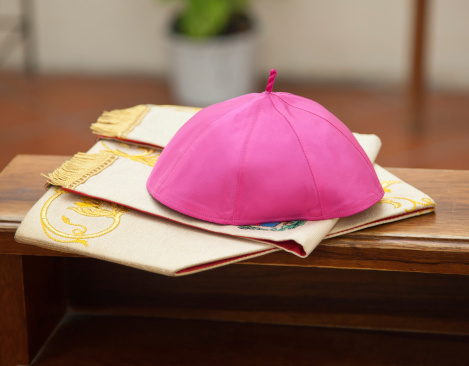 Neither New York’s Cardinal Timothy Dolan nor Albany’s bishop Edward Scharfenberger are in support of excommunicating New York’s “Catholic” Governor Andrew Cuomo after he championed one of the most radical pro-abortion laws in the nation. However a respected Canon lawyer believes the governor’s personal choice not to receive communion should now be made mandatory.
Neither New York’s Cardinal Timothy Dolan nor Albany’s bishop Edward Scharfenberger are in support of excommunicating New York’s “Catholic” Governor Andrew Cuomo after he championed one of the most radical pro-abortion laws in the nation. However a respected Canon lawyer believes the governor’s personal choice not to receive communion should now be made mandatory.
The Daily Wire is reporting on a statement issued by Cardinal Dolan’s spokesperson in response to tremendous pressure being put on him by the faithful to punish the governor for the January 22nd passage of the Reproductive Health Act (RHA) in the state of New York. Although passed under the guise of “updating the state’s abortion laws,” this barbaric law allows for infants to be killed up to the point of birth, and afterward if they are survivors of an abortion attempt. It will also allow non-physicians to perform abortions, removes informed consent and parental consent laws, and threatens the conscience rights of supporters of life.
The governor, who frequently refers to himself as a Catholic in public, not only supported the law, but championed it, even going so far as to order certain New York landmarks to be lit in pink lights to celebrate passage.
This so infuriated Catholics in the state that they demanded punitive action against the governor, most notably that of excommunication.
However, in a statement released on Friday by Cardinal Dolan’s spokesman, the New York prelate resisted these calls, saying that excommunication “should not be used as a weapon” and that the people calling for Cuomo’s ouster are only doing so out of “anger and frustration.”
The spokesperson issued a generic statement, saying it did not apply to any specific person, when it announced that there would be no punitive action against Cuomo at this time.
First, excommunication should not be used as a weapon. Too often, I fear, those who call for someone’s excommunication do so out of anger or frustration.
Second, notable canon lawyers have said that, under canon law, excommunication is not an appropriate response to a politician who supports or votes for legislation advancing abortion.
Third, from a pastoral perspective, if a pastor – and a bishop is certainly a pastor of a diocese – knows of a grave situation involving a parishioner, it is his duty to address that issue personally and directly with the parishioner. That was the approach of Cardinal O’Connor and Cardinal Egan (both of whom I served), and it is Cardinal Dolan’s approach as well.
Fourth, and finally, from a strategic perspective, I do not believe that excommunication would be effective as many politicians would welcome it as a sign of their refusal to be “bullied by the Church”, thinking it would therefore give them a political advantage. (See, for example, the case of Bishop Leo Maher and Lucy Killea).
With Dolan’s refusal announced, the faithful turned to Albany’s Bishop Edward Scharfenberger who also has jurisdiction over the governor because Albany is the state capitol where the law was passed, with the hopes that he might do something to ward off the enormous scandal of this incident.
But Bishop Scharfenberger also declined to excommunicate the governor:
“The whole purpose of excommunication is to note the sinner and to bring the person back to the full practice of the faith. It is not meant to satisfy a desire to see some punishment. Excommunication is a very severe measure but it is not intended to be punitive or vindictive, but rather reparative and constructive,” he said in a statement.
However, he did issue this warning to the governor and any other legislator who does not uphold the faith in their public lives:
“Those who hold public office and continue to alienate themselves from the Catholic faith in their persistent advocacy for the grave moral evil of abortion, as evidenced not only by the promotion of legislation, but also by their scandalous celebration of it, should be aware of the provisions of canon 915 of the law of the Church. According to Church law, to the extent that they continue in such obstinacy, they are not to present themselves for Holy Communion. The same canon leaves it up to the minister of the Sacrament to withhold Communion should such a person request reception. While not a formal excommunication, the law of the Church itself requires observance so long as such conditions persist.”
In a tweet issued the day after the passage of the RHA, respected canon lawyer Edward Peters says he believes that the governor has personally refrained from receiving Communion since the 2011 controversy concerning him living with a woman outside of marriage. However, he now believes that although excommunication would not be advisable under canon law, the governor’s “blatant promotion of New York’s murderous abortion law would, by itself, suffice to conclude he must not be admitted to the Sacrament per Canon 915.”
In other words, refraining from communion would no longer be a personal choice for Cuomo; it would be mandated.
In an article appearing in the Catholic World Report, Peters continues: “If information should reach ecclesiastical authority that Cuomo is, despite the foregoing, being given holy Communion by ministers under their authority, Church leaders should act immediately to prevent such administration.”
It remains to be seen if these measures will be taken in the near future.
© All Rights Reserved, Living His Life Abundantly®/Women of Grace® http://www.womenofgrace.com









